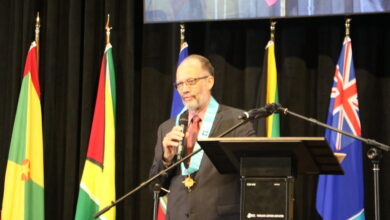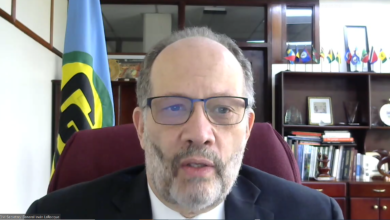(CARICOM Secretariat, Turkeyen, Greater Georgetown) Thank you for this invitation to speak at your quarterly Luncheon. This Luncheon affords me the first opportunity, since assuming office as Secretary-General some six months ago, to address a forum in Guyana outside of the confines of Secretariat’s Headquarters or a Secretariat organized event. The time could not be more appropriate for me to address you, given the crossroads at which the Caribbean Community finds itself. As clichéd as this sounds, the fact is we are at a crucial juncture in our integration arrangements. It is also a pleasure to break bread with you, as it were, and I trust that my remarks will be a fitting appetiser for the meal to follow.
Let me start with some information which, as business persons, I am sure you will appreciate. In 2010, the last year for which complete trade data is available, Guyana exported US$118.3 million worth of goods to the rest of the Caribbean Community (CARICOM). This ranked it third in the Community with respect to exports for that year to Member States and was six million dollars more than in 2009. The principal exports were rice, fish and sugar, in that order. These exports to the CARICOM market amounted to 13 percent of Guyana’s total exports. While three products dominate these exports, it nonetheless demonstrates that the CARICOM market is valuable to Guyana; and given Guyana’s vast economic and business potential, I suggest to you that with sustained focused attention, these exports can grow. The CARICOM market continues to be a business opportunity for the Guyana private sector.
And the importance of CARICOM is not peculiar to Guyana, as I have heard continuously over the past six months during my visits to Member States and listened keenly to the various stakeholders in each of those countries. Nor is its importance limited to trade and business. Stakeholders across the Region all see the hope and promise of CARICOM but are troubled by the seeming inability to bring to fruition the plans, programmes and projects that have been enunciated and announced over the years, and the decisions that wait to be implemented. The message so far has been clear: move with urgency to fulfill the goals of integration; or at least deliver on what you say you will deliver. This has held true whether from the youth, the proverbial man in the street or the private sector.
It must be recognised, however, that meeting the legitimate expectations of the people of our Community has become more challenging at a time when the effects of the global economic and financial crises, first felt in 2008, are still reverberating. I am not at all suggesting that the malaise in which we find ourselves is only and totally due to the global crises, but it certainly has exacerbated it. Also, it certainly has brought to the fore the need once again, to take stock of what we are doing and how we are doing it; how effective we are and are we delivering.
The Community, however, is not without a vehicle for realising those expectations. The construct of our integration arrangements, as embodied in the Revised Treaty of Chaguaramas and in the various other decisions and actions which have been taken over the years, provides for the creation and development of the CARICOM Single Market and Economy (CSME), buttressed as it were, by the other pillars of integration, namely Human and Social Development (through functional cooperation), Foreign Policy Coordination and Security Cooperation. Together, these four pillars define our Caribbean integration.
The CSME still remains as relevant today as when the idea was first conceived in Grand Anse in 1989. The CSME still represents tremendous potential to achieve the goals of growth and employment and to provide business opportunities, both with respect to manufacturing and services. It is a vehicle through which businesses utilizing the enlarged single economic space, now with a market of some 6 million, could begin to expand their horizons to enhance their competitiveness and so use the regional platform as a springboard into the global environment. And the market will grow to 15 million as soon as Haiti, a Member of the Caribbean Community, puts the necessary requirements in place to participate in the CSME.
But the CSME continues to be a work in progress, progress which has been characterized by some as being slothful. And one can understand the impatience of the people of the Community, especially in times of crisis. The CSME was launched in 2006. One year later, we announced to the world that by 2015 we would have in place the framework of a fully functional Single Economy, including a single currency, namely a Monetary Union. That 2015 target will not be met. We made then, as we continue to make now, the same mistake we made in 1989 at Grand Anse. We set ourselves over-ambitious and unrealistic targets; targets, which by their very nature, doom us to apparent failure when they are not met. I am not suggesting that we must set targets that allow for a leisurely pace. The world is not waiting on us. But what I am suggesting is that we must set targets which take into account not only the necessity and urgency of achieving the goal, but equally important, what it takes to get there and the resources available to us to do so.
I posit that to fulfill the objectives of the CSME, and indeed of the Community, we must do business differently. This is fully in keeping with the thrust of my Inaugural statement last August when I stressed that it could not be business as usual. As I stated then, this dictum applies not only to the CARICOM Secretariat but to the entire Caribbean Community, in other words, all stakeholders. This view has been supported by the Report of the Independent Consultants with respect to Restructuring of the Secretariat, much quoted in the media recently.
This Report benefitted from extensive consultations across the Community with various stakeholders in the integration process. While focusing on the CARICOM Secretariat, the Consultants have emphasized that reform of all our Institutions, Organs and systems is a prerequisite to achieving the results we all desire.
They also contend that we need to be more realistic about the constraints posed by geography, (spread as we are across the Caribbean Sea), lack of size physically and in respect of markets. Importantly, the Report, which will be considered by Heads of Government at next week’s Inter-Sessional Meeting in Suriname, also indicates it is essential for the Region to decide on what it can and cannot do. There is just so much that can be done given our realities, and the time has come for us to cut our suit to fit the cloth with which we have been endowed. This is nothing new. I have been saying this since coming into office. The Community needs to prioritise. This is in keeping with the views of the Heads of Government who, at a Retreat last May here in Guyana, decided on a list of priorities based on that realisation. We need to agree on these critical things that must get done; focus on them; get them done; and get them off the regional agenda so that we can take on new realistic priorities. The current mode of trying to get everything done at the same time is inefficient and contributes to gridlock, the so-called implementation deficit.
The role of the Secretariat in all this will be determined in large measure by the response of the Heads of Government to the Report of the Independent Consultants.
However, I must make the point that the view that all things CARICOM are within the purview of the CARICOM Secretariat is erroneous. There cannot be responsibility without authority. A critical element in going forward, therefore, must be a clear understanding that the Secretariat can no longer be all things to all persons. If we are to be more effective, we must be focused and adequately resourced to play any role that is envisaged by our Heads of Government. Or, to repeat, we must prioritize in keeping with the resources available to us.
Even as the effectiveness of the integration arrangements is being questioned by some stakeholders, they have recognised the value of the achievements in Health, Education, some aspects of the Single Market, External Trade and in Foreign Policy Co-ordination. In all of these areas, the Secretariat has been at the centre of the process. But the Secretariat must also acknowledge its part in the failure of the Community to achieve such measures as hassle free travel and free movement of skilled Community nationals. These are issues that tug at the heart of CARICOM’s people and, for many, it is the measure of successful integration.
Mr. Chairman, Ladies and Gentlemen, I am convinced that in order to achieve results from the priorities laid out by the Heads of Government, the private sector must play a crucial role. A valid question would therefore be what are we doing at the level of the Community to create an environment for you to prosper and contribute to the development of this Region and to advance your prospects in the global market place? What are we doing to convey to the people of CARICOM that we are taking a different and more dynamic approach to addressing their concerns? Perhaps, thus far we have been taking too much of a theoretical and dogmatic approach rather than a strategic and pragmatic approach in the creation of the CSME.
Job creation is one of the priorities identified by our Heads of Government. Given the current relative sluggishness of some regional economies, tremendous pressure is put on Governments to stimulate sustained growth and employment. It is therefore critical that the regional environment for private sector involvement and growth be created in order to provide much needed employment. What then can we as a Region do to create that regional environment that will engender business growth and job creation?
An important element is the ease with which you should be able to conduct your business throughout the Region.
A study conducted by the Inter-American Development Bank (IDB) found that CARICOM intra-regional trade can double from its current 16 per cent of total trade if we address issues relating to trade facilitation and transportation. Given the Region’s high food import bill, agricultural production for export, an area in which Guyana, Suriname and Belize enjoy certain comparative advantages, suggests itself naturally for such expansion of trade.
But I have heard time and again of the time consuming bureaucracy involved in trading in the Region, and of the lack of harmonised procedures within the Single Market in respect of Customs and Sanitary and Phyto-sanitary Rules and Regulations. I have been told of containers of agricultural products being held up at ports of entry due to Phyto-sanitary Regulations. The absence of such transparent and harmonized procedures not only retards trade, creates distortions in the Market and leads to uncertainty, but affects your competitiveness, your profit margins and the final price to the consumer. An important maxim in business is “time is money”. One business person said to me that trade facilitation and the ease of doing business are as of equal importance, if not more, as are fiscal incentives.
The lack of standardisation of procedures at ports of entry for goods is a matter that I have taken on board and am seeking ways to facilitate a solution. In fact, you may be aware that the Region, through the CARICOM Customs Committee, has been working on Harmonized Customs Legislation. That piece of work is taking much too long but I am told that it is well advanced and will no doubt be a major boost to facilitating trade in the Community. As regards Sanitary and Phyto-sanitary Rules and Regulations, much needs to be done. The recently formed, but not yet operational, Caribbean Agricultural Health and Food Safety Agency (CAHFSA) would be at the centre of harmonizing the different policies, practices, requirements and standards applied by different CARICOM countries to facilitate the free flow of agricultural goods.
Another persistent challenge lies in the Transportation sector. This affects both goods and people in terms of costs and access. Separated as we are by sea, except for Suriname and Guyana, maritime and air transportation are the lifeblood of the Community. Without these services working efficiently, the excellence of your products and services will not realise their true revenue earning potential. Further, continued inefficient and costly transportation services could serve to frustrate our efforts at sharing resources for joint production.
In recognition of the critical importance of these vital means of transportation to regional integration, a study, funded by the Government of Trinidad and Tobago, has been completed in respect of a sub-regional ferry service in the southern Caribbean and its establishment approved by the Cabinet of that country. Also, the CARICOM Secretariat has been partnering with the Caribbean Association of Industry and Commerce, the OECS Secretariat and the Centre for the Development of Industry in a project, aimed at examining ways in which regional small-vessel owners and operators and other industry representatives could improve the standard of vessels and the scheduling of their operations. It is expected that the outcome of this collaboration will lead to some improvement in the Maritime Transportation sector. We must think outside the box. In speaking with some shipping agents, they have said that the problem is larger and a solution rests with all of us.
Our Region is also confronted in some cases by costly telecommunications and energy services which contribute to high production costs and limit the prospects for business growth and expansion. Those factors also impinge upon our ability to take full advantage of the on-going revolution in Information and Communications Technologies to improve our products and services and to create new profit centres. Both of these areas need more priority and focused attention.
However, even with those challenges, and indeed there are others, this Region has been able to be globally competitive in some products and services. The success of El Dorado Rum is just one such example of the quality that regional products have attained. Guyana furniture is seen in many hotels throughout the Caribbean, and I am told in the United States. I have also been to factories in St Kitts and Nevis which specialise in the production of top quality hi-tech goods for the international market. These factories are taking advantage of the Economic Partnership Agreement (EPA) with the European Union (EU), as well as exporting to the United States of America (USA), Latin America and Asia including China. Exports to the USA alone amount to almost $68 million annually.
With respect to Services, trade in that sector globally is growing faster than trade in goods. Our diverse tourism product continues to be the major contributor to the Region’s gross domestic product and, with the bourgeoning interest in eco-tourism, this can become even more significant. The Region has also been attracting off-shore tertiary education institutions and increasing interest has been shown in the potential for Health and Wellness tourism. Other areas of the sector that have potential for a significant increase in earnings include construction, creative industries and financial and professional services.
Our Cultural Services are in great demand whether it is in the performing or visual arts. As recognised as we are in these fields we can do more to benefit from the global market in creative goods and services which reached US $593 billion in 2008, according to the Creative Economy Report (2010) by two United Nations Agencies.
However, the Services Sector needs to be developed through the adoption of appropriate regional policies and a regulatory framework. We need to ensure that our service providers are free to move to ply their trade without hassle.
I mentioned earlier that the CARICOM arket remains a business opportunity for the Guyana private sector. Let me demonstrate. An important element of our regional trading arrangements is the Common External Tariff (CET). The CET is supposed to provide an equal level of protection for goods of CARICOM origin. In other words, we have created a preferential market for our producers. The Rules governing the CET make provisions to allow Member States to suspend the Tariff of a particular product when that product is not available in sufficient quantities in the Community. There are several products for which suspensions are regularly sought, which can be produced for export right here in Guyana.
In 2011 for example, the Secretariat received eight (8) requests for suspension of the CET for pineapple juice concentrate and cherry concentrate, amounting to approximately 1.1 thousand metric tons and 420 metric tons, respectively. In addition, twelve (12) requests were received for turmeric amounting to approximately 2,000 metric tons. There were fourteen (14) requests for soya bean oil amounting to 32,000 metric tons. Seven (7) requests were received for peanuts amounting to 7.5 million kilograms. Five (5) requests for ginger amounting to 89,000 kilograms and four (4) requests for thyme totalling 53,000 kilograms, were also received. These are but a few of the many opportunities which Guyanese and other regional producers and manufacturers could, and must grasp. If they do intra-regional trade can be increased significantly.
I can inform you that the Secretariat is engaged in collating the list of items for which Member States have requested suspensions of the CET over a number of years. This list is intended to be shared with you, the private sector, so that you can identify opportunities for investment, given that the suspensions and derogations relate to products either not available or not available in sufficient quantity to satisfy regional demand.
You are no doubt aware that the Community has signed a number of Trade Agreements with Third countries, including the CARIFORUM-EU Economic Partnership Agreement (EPA). This demands that our range of goods and services now must be of a standard to compete in a more liberalised trading environment. Obviously, the mere signing of Trade Agreements does not, in itself, constitute a boon to our private sector but there are those of your colleagues who have benefited from entering these larger markets. In many cases, however, we are not in a position to take advantage immediately of whatever opportunities these may present due to capacity constraints and the need to become more competitive and market oriented.
Now, I must say up front what I am sure may be obvious to you. The Secretariat is not structured to provide the assistance required by the private sector to enable you to take advantage of the opportunities provided by the EPA and other Trade Agreements. But, we are well poised to mobilize resources for the use of other institutions which are better able to provide such assistance. One such regional Institution is the Caribbean Export Development Agency (CEDA).
Under the European Union-funded Caribbean Regional Indicative Program, there is provision for direct assistance to the private sector to assist with access to EU markets. Twenty-eight million Euros in grant funds have been made available to the Caribbean Export Development Agency to provide direct support to the Caribbean private sector to enhance competitiveness and innovation. There is no reason why members of this Association should not be beneficiaries of such assistance which is possible through the submission of appropriate proposals to Caribbean Export by the private sector.
Based on studies which were funded by the EU and facilitated by the Secretariat, I am advised that forty million US dollars have been mobilized by the IDB for the Compete Caribbean Project which is primarily aimed at the private sector.
Additionally, the Secretariat, with the assistance of the Inter-American Development Bank (IDB), is currently developing a Regional Aid for Trade Strategy to be utilized in approaching international development partners for support to substantively build CARICOM’s production and trade capacity. Such support allows the Region to make significant competitiveness gains in the short to medium term.
As far as Trade Agreements are concerned, we are in the fourth year of implementation of the CARIFORUM-EU Partnership Agreement. The Secretariat is actively engaged in building awareness among the public and private sectors in Member States of its Provisions and the opportunities it offers. The Community is currently negotiating with Canada for the establishment of a Trade and Development Agreement which will consolidate the duty-free access our exporters currently enjoy under CARIBCAN and expand the opportunities for exports of other goods and services. However, the trade arrangements under the new Agreement will be reciprocal, requiring us to grant Canada levels of preferential access. Critical to the successful conclusion of an Agreement with Canada is the incorporation of a development component to address the supply side constraints of CARICOM’s private sector.
Also, the Community, led by the CARICOM Secretariat, is in the process of arranging for an engagement with the authorities in the Dominican Republic with a view to revitalizing the CARICOM-Dominican Republic Free Trade Agreement. We expect that the regional private sector will be integrally involved as we move forward with this engagement.
Policy wise, work is ongoing on a Community Industrial Policy. At present, a Draft is before the Secretariat and it is intended that before long, it would be presented to Member States for final approval.
The goal of that Policy is to achieve “market-led, internationally competitive and sustainable production of goods and services for the promotion of the Region’s economic and social development.” A key element in achieving that goal would be the cross-border utilisation of natural and human resources, capital and technology.
Having recognised that the vast majority of our private sector is in the micro, Small and medium enterprise category, we are seeking to promote the further development of these enterprises through a project titled, “Integrate Small and Medium Enterprises (SMEs) into the CSME”. Among its objectives are an increase in the number of production integration possibilities for SMEs and an increase in SME productivity in those industries where an international competitive advantage may exist.
Ladies and Gentlemen, all these measures I have outlined are set in the context of encouraging private sector growth and competitiveness which, in turn, would lead to profits and thereby create employment. There is no doubt that the debilitating effects of the global financial crisis (of 2008), which led to a 12% fall in international trade and contraction in economic activity in 2009, reversed economic gains which had steadily accrued to many CARICOM economies in the preceding years.
The regional private sector has since gradually clawed its way back. Exports, which declined by 46% in 2009, demonstrated a modest 15% expansion in 2010 and again expanded in 2011. However, CARICOM’s exports are not likely to hit pre-2009 levels in the near future.
This could be compounded by the prediction that after expanding over the last two years, global economic growth rates may decline again in 2012, fuelled by the unsustainable fiscal deficit in the USA and the fiscal challenges which have forced the implementation of austerity measures in the EU. This suggests that the negative effects of the financial crisis will continue to linger for some time.
It is against that background that I came to office in August and set my sights on working towards ensuring that the priorities set out by the Heads of Government last May, make the impact on the everyday lives of the citizens of the Community that we all desire. My vision for this Community during my tenure sees all of us as stakeholders not only in that process, but in achieving the objectives laid out in the Revised Treaty of Chaguaramas among which are improved standards of living and work, and full employment of labour and other factors of production. I trust you will join me in fulfilling that vision.
I thank you.




